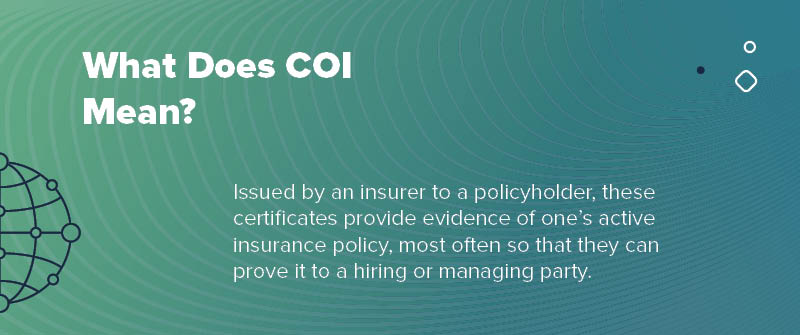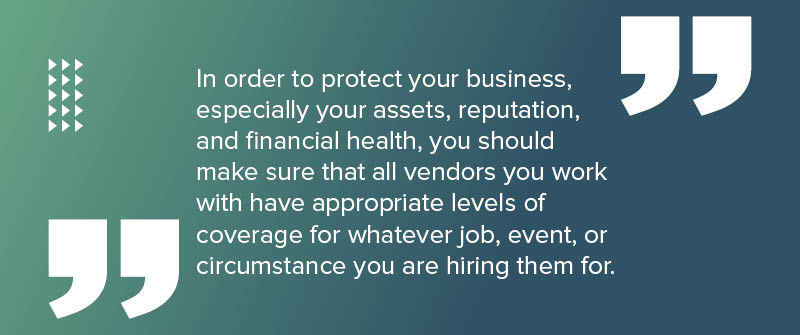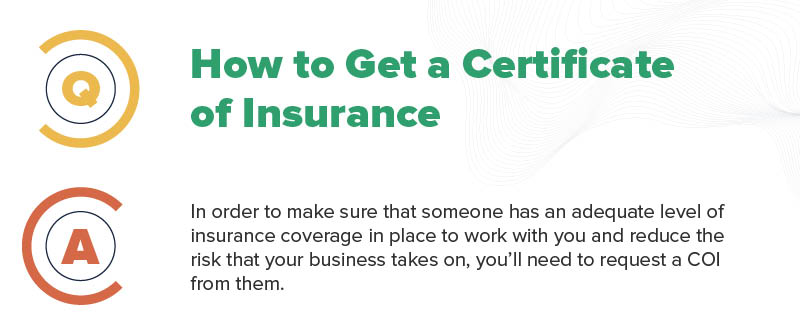
If you’ve stumbled upon this article, you’ve probably heard the terms COI, certificate of insurance services, insurance, and compliance thrown around in your line of work. Ensuring that every third-party service provider you work with or tenant you manage has an appropriate amount of insurance coverage protects not only them—but you as the business working with them. Let’s discuss what you need to know about a COI in insurance terms, what is included in a COI, and when and why you should be requesting them.
What Does COI Mean?
When people mention a COI or certificate of insurance, they’re referring to a document widely used in the insurance industry. Businesses and individuals utilize COI forms in order to verify people’s coverage—especially those like vendors, contractors, or third-party service providers.
Issued by an insurer to a policyholder, these certificates provide evidence of one’s active insurance policy, most often so that they can prove it to a hiring or managing party. Because hiring parties don’t want to be held responsible for downstream risk, it is a best practice in multiple industries to ensure that any contractors or vendors you work with have insurance coverage and are able to prove it with a pertinent certificate.

Is a COI the Same as General Liability Insurance Coverage?
A COI is not the same thing as general liability, nor is it the same thing as any policy. However, they’re very related.
Both an insurance policy and a related certificate of insurance contain important details about someone’s coverage, such as the policyholder’s name and information, the type of insurance coverage provided, and the effective dates of coverage, to name a few.
Still, there are major differences between a general liability insurance policy and a general liability insurance certificate—we’ll get to those next.
What Is the Difference Between an Insurance Policy and a COI?
An insurance policy—business insurance or liability coverage for example— is a legal contract produced by an insurance provider and given to a policyholder. Policies outline the terms, conditions, and details of insurance coverage. Essentially, an individual or business will decide that they need protection from possible liabilities or claims, go to an insurer to request coverage, and pay monthly premiums to them so that if and when a covered situation occurs, the insurer will pay for the corresponding damages, not the purchaser of the policy.
Insurance certificates, or COI, is actually proof of an insurance policy. It’s a much shorter document than an insurance policy, usually limited to a page, and is basically a summary of one’s coverage. Insurance providers are also responsible for generating COIs, and can do so at the request of the policyholder being covered, typically in order to provide evidence of their insurance coverage to a hiring party or other business or individual.
What Does COI Include?
Although usually just one page long, COIs provide a wealth of important information about a policyholder and their corresponding insurance policy. Here are the coverage details they typically include:
- Policyholder information. The individual receiving coverage under an insurance policy will be noted at the top of the document. They are the only ones who can request and receive this document as it pertains to their insurance coverage.
- Insurance provider information. The insurance company providing the protection under a legally binding insurance policy is the only entity that can produce a COI corresponding to that policy. They will thus be documented on the certificate.
- Policy number. Each insurance policy has a unique code associated with it. This will be noted on the document so it is clear to everyone involved which specific policy is being proven.
- Type of insurance coverage. Along with the policy number, the insurance policy will be identified by its type of coverage. For example, COIs can provide evidence of both general liability insurance and professional liability insurance, and that distinction is important.
- Policy coverage limits. This refers to the amount of coverage that an insurer agrees to provide under a policy—the maximum amount of financial protection they will grant based on how much the policyholder is paying in monthly premiums.
- Effective dates of coverage and expiration date of the policy. These denote the amount of time in which the policy is actively covering the policyholder and the specific date that the coverage terminates if not renewed.
- Endorsements. Within insurance policies, there are opportunities to add on items that modify the terms of coverage. For example, it’s popular in some industries for a hiring business to require an individual to add the business onto their insurance policy by way of an additional insured endorsement, which would grant them the same coverage as the policyholder.
- Certificate holder information. Finally, the entity requesting evidence of coverage from a policyholder, who is intended to receive the version of the document after its issuance, will be noted on the certificate as well.
Who Should the Certificate Holder Be on a COI?
Speaking of certificate holders—who exactly should be yours when requesting a COI? Typically, this is the person most closely tied to managing compliance for a company. Suppose there’s not a designated compliance manager or COI tracker at your company. In that case, the certificate holder’s title should generally go to the one most closely involved in hiring the third party or vendor that you want to verify coverage for.
Why Do Companies Request COI?
As we mentioned before, there are many reasons why a company would want to request a COI.
For one thing, you don’t want anyone getting hurt on the job and not being able to handle the financial ramifications of the accident due to a lack of coverage. For another, it is common across multiple industries for regulations and compliance standards to mandate a level of coverage, meaning that if a worker you hire doesn’t have enough, it could be your company that’s held accountable.
Finally, in order to protect your business, especially your assets, reputation, and financial health, you should make sure that all vendors you work with have appropriate levels of coverage for whatever job, event, or circumstance you are hiring them for. This will help you reduce your level of liability, risk, and likelihood of common (potentially costly) claims. Their coverage should be comparable to your own so that in the event of a claim, their insurance will respond instead of yours.

When Do You Need a Certificate of Insurance From a Vendor?
People use COIs across many industries in order to verify the coverage of someone they’re working with. Let’s walk through a few scenarios where you’ll want to verify a certificate of insurance for vendors you wish to work with.
- Businesses almost always require a certificate of insurance for contractors in order to make sure they have the correct protections in place (e.g., general liability insurance) to complete a potentially dangerous construction job.
- Property managers often require COIs from their tenants in order to ensure that they have appropriate insurance to cover their particular operations.
- Businesses renting vehicles or purchasing supplies should make sure their vendor has a COI and coverage in case anything happens with the vehicle or supply delivery.
As for when you should request the COI from a vendor, third-party service provider, or other relevant entity, the answer is: as soon as possible. It’s important to obtain a relevant insurance certificate before actual work begins so you’re not opening yourself up to risk, and the earlier, the better because you’ll need time to make sure that it meets your requirements, too.
How to Get a Certificate of Insurance
In order to make sure that someone has an adequate level of insurance coverage in place to work with you and reduce the risk that your business takes on, you’ll need to request a COI from them.
First, you should outline your vendor COI requirements, such as the type of insurance policy you need them to provide evidence of, the policy limits that meet your needs, and a workable timespan of coverage. Then, you’ll send the worker a COI request via email, mail, or in-person ask.
Upon receiving this request, the workers themselves will have to go to their insurance provider (or use their online insurance portal if they have one) and request a COI of the policy you want evidence of, naming you as the certificate holder. Processing times for issuance can range from a couple of days to a few weeks. Once the insurance provider has generated the certificate, they’ll send it back to the worker or directly to you.

An important note: there is no COI insurance cost—a policyholder must pay their insurance agency in order to obtain and maintain coverage, but a certificate can be generated free of charge upon request.
Once you have verified that your COI requirements have been met by the policyholder, you can begin your work with them with peace of mind knowing that they have the correct coverage in place.
How myCOI Makes COI Management Easy
Gaining a thorough understanding of COI requesting, verifying, and tracking/management takes a lot of time and research. Why not rely on our team of industry experts who know the process like the back of their hand, even better than an insurance agent? Learn more about how myCOI can help you manage your COIs with ease by booking a demo with us today.